M. A. Eriksson
BATIS: Bootstrapping, Autonomous Testing, and Initialization System for Quantum Dot Devices
Dec 10, 2024
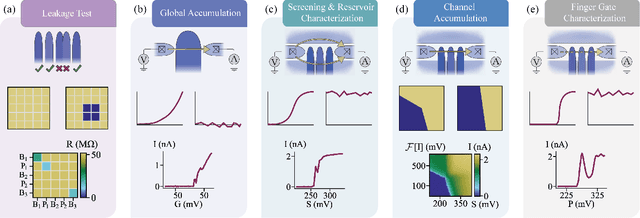
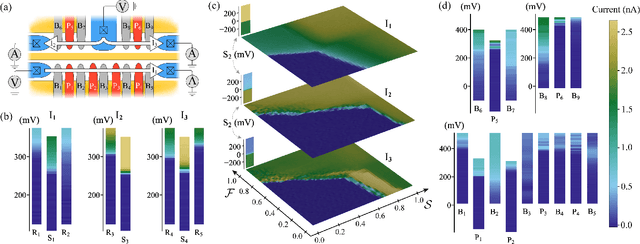
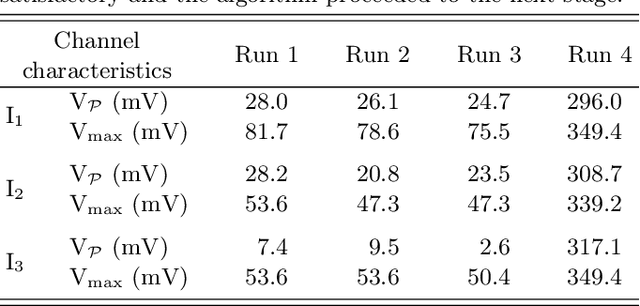
Abstract:Semiconductor quantum dot (QD) devices have become central to advancements in spin-based quantum computing. As the complexity of QD devices grows, manual tuning becomes increasingly infeasible, necessitating robust and scalable autotuning solutions. Tuning large arrays of QD qubits depends on efficient choices of automated protocols. Here, we introduce a bootstrapping, autonomous testing, and initialization system (BATIS), an automated framework designed to streamline QD device testing and initialization. BATIS navigates high-dimensional gate voltage spaces, automating essential steps such as leakage testing and gate characterization. The current channel formation protocol follows a novel and scalable approach that requires a single measurement regardless of the number of channels. Demonstrated at 1.3 K on a quad-QD Si/Si$_x$Ge$_{1-x}$ device, BATIS eliminates the need for deep cryogenic environments during initial device diagnostics, significantly enhancing scalability and reducing setup times. By requiring minimal prior knowledge of the device architecture, BATIS represents a platform-agnostic solution, adaptable to various QD systems, which bridges a critical gap in QD autotuning.
Explainable Classification Techniques for Quantum Dot Device Measurements
Feb 23, 2024



Abstract:In the physical sciences, there is an increased need for robust feature representations of image data: image acquisition, in the generalized sense of two-dimensional data, is now widespread across a large number of fields, including quantum information science, which we consider here. While traditional image features are widely utilized in such cases, their use is rapidly being supplanted by Neural Network-based techniques that often sacrifice explainability in exchange for high accuracy. To ameliorate this trade-off, we propose a synthetic data-based technique that results in explainable features. We show, using Explainable Boosting Machines (EBMs), that this method offers superior explainability without sacrificing accuracy. Specifically, we show that there is a meaningful benefit to this technique in the context of quantum dot tuning, where human intervention is necessary at the current stage of development.
* 5 pages, 3 figures
Toward Robust Autotuning of Noisy Quantum Dot Devices
Jul 30, 2021

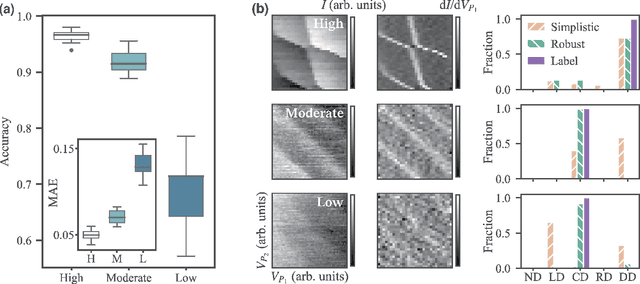
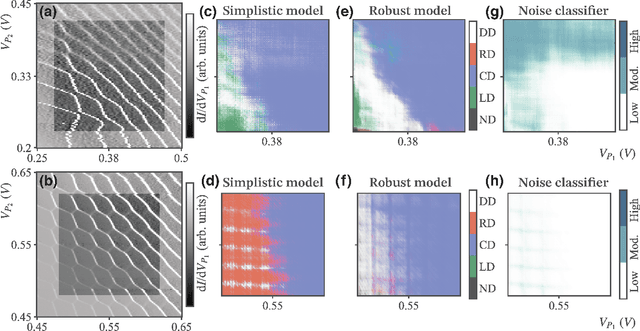
Abstract:The current autotuning approaches for quantum dot (QD) devices, while showing some success, lack an assessment of data reliability. This leads to unexpected failures when noisy data is processed by an autonomous system. In this work, we propose a framework for robust autotuning of QD devices that combines a machine learning (ML) state classifier with a data quality control module. The data quality control module acts as a ``gatekeeper'' system, ensuring that only reliable data is processed by the state classifier. Lower data quality results in either device recalibration or termination. To train both ML systems, we enhance the QD simulation by incorporating synthetic noise typical of QD experiments. We confirm that the inclusion of synthetic noise in the training of the state classifier significantly improves the performance, resulting in an accuracy of 95.1(7) % when tested on experimental data. We then validate the functionality of the data quality control module by showing the state classifier performance deteriorates with decreasing data quality, as expected. Our results establish a robust and flexible ML framework for autonomous tuning of noisy QD devices.
 Add to Chrome
Add to Chrome Add to Firefox
Add to Firefox Add to Edge
Add to Edge